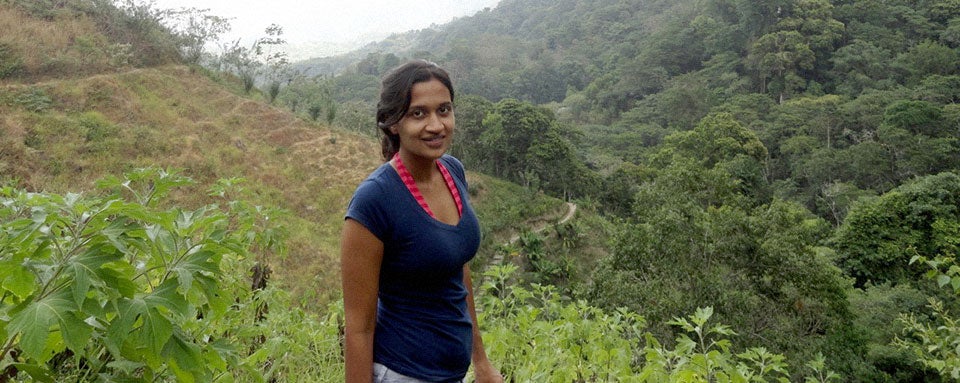Note: Yale School of the Environment (YSE) was formerly known as the Yale School of Forestry & Environmental Studies (F&ES). News articles and events posted prior to July 1, 2020 refer to the School's name at that time.

Pooja Choksi ’17 M.E.M., a first-year Master’s student focused on community-based wildlife conservation, was recently awarded the Sidney Byers Scholarship for Wildlife Conservation from the Wildlife Conservation Network (WCN).
The $12,000 scholarship will support her studies in her second year at F&ES, during which she will focus on the study of population connectivity of the tiger, community-based wildlife conservation and building coexistence landscapes in her native India.
The WCN Scholarship Program supports students from Africa, Asia, Eastern Europe, and Latin America who are committed to working on wildlife conservation in their home countries.
It is the first time that an F&ES student has received the award.
Choksi, who says she inherited her love of nature — and particularly tigers — while camping and hiking with her mother, says she decided to attend F&ES because of its interdisciplinary approach to environmental studies. Integrating different areas of study, she says, will be critical to protect wildlife as well as the human communities that exist alongside it.
Before coming to Yale, she was a program manager with the Conservation Wildlands Trust in the Pench Tiger Reserve, where she developed a three-year environmental educational curriculum for school children and assisted in the development of alternative livelihoods in the buffer regions of the reserve.
She plans to return to Pench after graduation to apply the lessons that she has learned at F&ES, and to eventually expand her work into more regional conservation work across central India, a prime landscape for tigers.
“I am interested in promoting a more bottom-up approach thereby making the community-based wildlife conservation model more inclusive,” she says. “I will work on wildlife conflict mitigation applying tools and technology like that of cell phones and GIS in buffer regions of tiger reserves in India. Through the medium of conflict mitigation, I wish to propagate the idea of humans and wildlife as parts of the same ecosystem as opposed to two completely disconnected entities.”
She says her course work and independent studies have equipped her for these conservation challenges, “empowering me with important skills and knowledge [including] performing landscape connectivity analysis of a species, designing a qualitative assessment of community based projects, analyzing anthropological discourses on development and strategizing and building non-profit programs, to name a few.”
“I’m honored to receive this scholarship,” she said, “and I look forward to making the most of my second year at F&ES.”
The $12,000 scholarship will support her studies in her second year at F&ES, during which she will focus on the study of population connectivity of the tiger, community-based wildlife conservation and building coexistence landscapes in her native India.
The WCN Scholarship Program supports students from Africa, Asia, Eastern Europe, and Latin America who are committed to working on wildlife conservation in their home countries.
It is the first time that an F&ES student has received the award.
Choksi, who says she inherited her love of nature — and particularly tigers — while camping and hiking with her mother, says she decided to attend F&ES because of its interdisciplinary approach to environmental studies. Integrating different areas of study, she says, will be critical to protect wildlife as well as the human communities that exist alongside it.
Before coming to Yale, she was a program manager with the Conservation Wildlands Trust in the Pench Tiger Reserve, where she developed a three-year environmental educational curriculum for school children and assisted in the development of alternative livelihoods in the buffer regions of the reserve.
She plans to return to Pench after graduation to apply the lessons that she has learned at F&ES, and to eventually expand her work into more regional conservation work across central India, a prime landscape for tigers.
“I am interested in promoting a more bottom-up approach thereby making the community-based wildlife conservation model more inclusive,” she says. “I will work on wildlife conflict mitigation applying tools and technology like that of cell phones and GIS in buffer regions of tiger reserves in India. Through the medium of conflict mitigation, I wish to propagate the idea of humans and wildlife as parts of the same ecosystem as opposed to two completely disconnected entities.”
She says her course work and independent studies have equipped her for these conservation challenges, “empowering me with important skills and knowledge [including] performing landscape connectivity analysis of a species, designing a qualitative assessment of community based projects, analyzing anthropological discourses on development and strategizing and building non-profit programs, to name a few.”
“I’m honored to receive this scholarship,” she said, “and I look forward to making the most of my second year at F&ES.”
Published
April 20, 2016